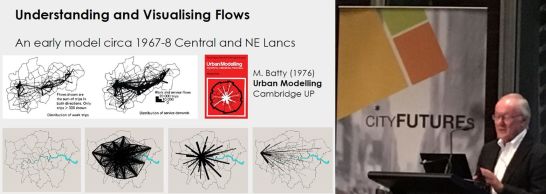I am a new Research Fellow at the City Futures Research Centre (CFRC) in UNSW, and cannot think of a better time to start, as it is the Centre’s 10 year celebration. The week of activities with academic, government, industry and community partners at the Royal Mint in Sydney CBD was a time for looking back at CFRC‘s achievements so far, and for thinking ahead towards new challenges cities will face.
As part of this celebration Prof Michael Batty, from University College London (UCL)/Centre of Advanced Spatial Analysis (CASA), visited CFRC. On Thursday 12 November he presented a public lecture on ‘Big data, little data, real time streaming and the smart city’. The session was chaired by Prof Chris Pettit who announced UNSW’s plans for a Master of City Science to be available in 2017.
Prof Batty took us through a journey about how cities are getting more complex, data is becoming bigger and more diverse, and how urban science has been evolving along the way to respond to higher demands for computer modelling and visualisation techniques. Case examples involved early mappings from his 1976 book on ‘Urban Modelling’ (Cambridge Press) to impressive 3D animations related to his 2013 book on ‘The new science of cities’ (MIT Press).
Prof Batty emphasised some important topics in his speech that need reflection. First, he made a call to the audience to look at cities as ‘flow systems’, changing the focus from locations to interactions among locations. In this case, he highlights, even small and conventional datasets become big. Second, he states that complexity in cities is driven by new information technologies. And this is because technologies are embedded in cities, intrinsically shaping new social and economic behaviour; and at the same time scientists and planner are using technologies to understand, plan and manage cities. Finally, he reminded us that technology is never neutral. ‘It is always value laden and we do have choices and the biggest problems tend to be tangential to new IT.’
Urban researchers are faced on one side by the impacts of technological advances (increasing availability of digital data and sophisticated analytical methods, ubiquity of computation), and on the other side by aspirations of urban equity, quality of life, resilience, and good governance. In the space between means and aspirations, can we achieve better living in urban areas through information and technology? This is a question being seriously considered by the City Futures Research Centre at UNSW, particularly in the context its 10 year celebration and new agenda, and the consolidation of its new research stream on City Analytics.


No Comments so far ↓
There are no comments yet...Kick things off by filling out the form below.